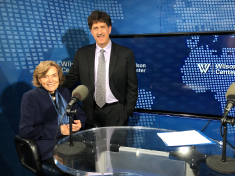-
With Knowledge Comes Responsibility: A Conversation with Sylvia Earle on the Ocean
August 9, 2019 By Benjamin Bosland “Having a planet that is suitable for us has taken a very long time, like four and a half billion years,” said Sylvia Earle, Explorer in Residence at the National Geographic Society, in a podcast interview with Ambassador David Balton before a recent Wilson Center event on marine protected areas. “It’s taken us about four and a half decades to significantly unravel, deplete, [and] modify those precious systems that really have little margin of error.”
“Having a planet that is suitable for us has taken a very long time, like four and a half billion years,” said Sylvia Earle, Explorer in Residence at the National Geographic Society, in a podcast interview with Ambassador David Balton before a recent Wilson Center event on marine protected areas. “It’s taken us about four and a half decades to significantly unravel, deplete, [and] modify those precious systems that really have little margin of error.” “Having a planet that is suitable for us has taken a very long time, like four and a half billion years,” said Sylvia Earle, Explorer in Residence at the National Geographic Society, in a podcast interview with Ambassador David Balton before a recent Wilson Center event on marine protected areas. “It’s taken us about four and a half decades to significantly unravel, deplete, [and] modify those precious systems that really have little margin of error.”
After decades of working in marine research and exploration, Earle noted that rapid technological development during the second half of the 20th century led to major discoveries in ocean science, possibly more than all preceding history. “Today, we’re beginning to engage technologies that will enable humans to experience the ocean as well as to deploy an incredibly growing array of sensors and devices to map the ocean,” she said.
However, despite our expanded understanding of marine science, ignorance poses the biggest challenge to oceans today, said Earle. “Why don’t people care about the ocean? Most people see it from the surface if they see it at all.” They miss the abundance of life in the ocean. Yet the ocean and its relationship to planetary processes is vitally important to our economy, security, health, and prosperity. The ocean is what keeps us alive. “No ocean, no life,” said Earle.
Despite what we now know about the nature of the world and what it takes to hold the planet steady, keeping the planet’s chemistry within safe limits, she said, we are perversely still “burdened with habits that are born of a time” when we did not fully understand the fragility of the earth. Humans are still changing the earth’s temperature, shifting the chemistry of the air and water, and slaughtering wildlife. Especially in the ocean, the scale of this degradation is unprecedented, she said.
We still have policies created when we thought that the ocean was too big to fail. Laws and policies still allow the legal extraction of large quantities of wildlife from the ocean, sending the message that it is okay to do things even though they are really threatening our existence. Protecting nature must no longer be optional, but rather our highest priority, she said. If we fail to stabilize the way the natural systems function, nothing else matters, she said.
We must do everything we can to “give nature a break,” said Earle. We must embrace critical natural areas that are still in good shape to ensure that they remain in good condition, and we must do everything we can to restore areas that have already been depleted or damaged. “It makes sense to at least identify some of the most critical areas and embrace them with care,” she said. “That’s not a lot to ask. In fact, I think we are asking too little.” Quoting Chilean President Sebastián Piñera, Earle said, “We are of the first generation to know what the problems are, and we are the last generation to be able to do something about it.”
Friday Podcasts are also available for download on iTunes and Google Podcasts.
Topics: biodiversity, conservation, environment, featured, Friday Podcasts, media, oceans, podcast, polar, protected areas, water
 A Publication of the Stimson Center.
A Publication of the Stimson Center.

 “Having a planet that is suitable for us has taken a very long time, like four and a half billion years,” said Sylvia Earle, Explorer in Residence at the National Geographic Society, in a podcast interview with Ambassador David Balton before a recent Wilson Center
“Having a planet that is suitable for us has taken a very long time, like four and a half billion years,” said Sylvia Earle, Explorer in Residence at the National Geographic Society, in a podcast interview with Ambassador David Balton before a recent Wilson Center 

